(完整版)介词for用法归纳
介词for的用法归纳
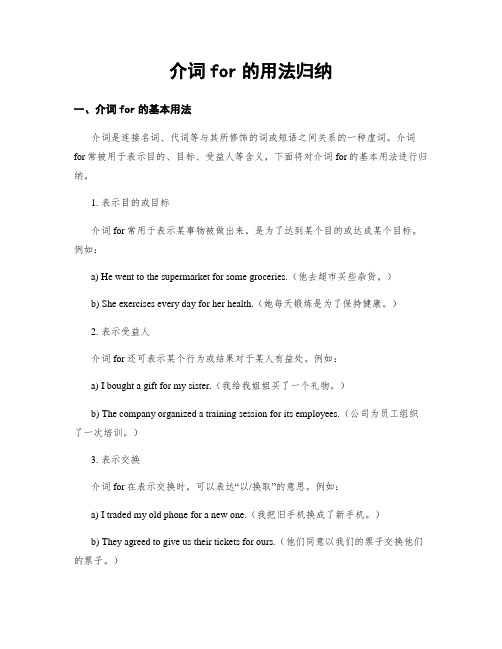
介词for的用法归纳一、介词for的基本用法介词是连接名词、代词等与其所修饰的词或短语之间关系的一种虚词。
介词for常被用于表示目的、目标、受益人等含义,下面将对介词for的基本用法进行归纳。
1. 表示目的或目标介词for常用于表示某事物被做出来,是为了达到某个目的或达成某个目标。
例如:a) He went to the supermarket for some groceries.(他去超市买些杂货。
)b) She exercises every day for her health.(她每天锻炼是为了保持健康。
)2. 表示受益人介词for还可表示某个行为或结果对于某人有益处。
例如:a) I bought a gift for my sister.(我给我姐姐买了一个礼物。
)b) The company organized a training session for its employees.(公司为员工组织了一次培训。
)3. 表示交换介词for在表示交换时,可以表达“以/换取”的意思。
例如:a) I traded my old phone for a new one.(我把旧手机换成了新手机。
)b) They agreed to give us their tickets for ours.(他们同意以我们的票子交换他们的票子。
)二、介词for的进一步用法除了上述基本用法外,介词for还有一些特殊用法需要注意。
下面将进一步归纳这些用法。
1. 表示时间段介词for可以表示一个时间段的长短。
例如:a) I have been studying English for three years.(我学习英语已经三年了。
)b) He will be away on a business trip for a week.(他将因公出差一个星期。
)2. 表示代替或代理介词for还可表示某人代替另一个人做事或担任职务。
英语介词for的用法归纳总结.doc
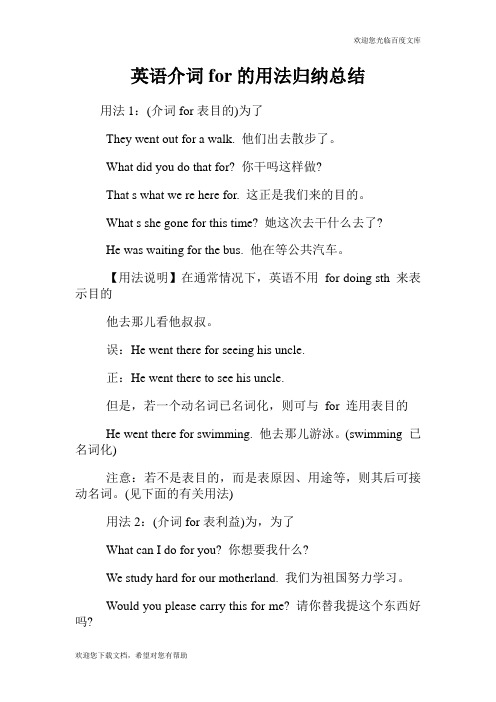
英语介词for的用法归纳总结用法1:(介词for表目的)为了They went out for a walk. 他们出去散步了。
What did you do that for? 你干吗这样做?That s what we re here for. 这正是我们来的目的。
What s she gone for this time? 她这次去干什么去了?He was waiting for the bus. 他在等公共汽车。
【用法说明】在通常情况下,英语不用for doing sth 来表示目的他去那儿看他叔叔。
误:He went there for seeing his uncle.正:He went there to see his uncle.但是,若一个动名词已名词化,则可与for 连用表目的He went there for swimming. 他去那儿游泳。
(swimming 已名词化)注意:若不是表目的,而是表原因、用途等,则其后可接动名词。
(见下面的有关用法)用法2:(介词for表利益)为,为了What can I do for you? 你想要我什么?We study hard for our motherland. 我们为祖国努力学习。
Would you please carry this for me? 请你替我提这个东西好吗?Do more exercise for the good of your health. 为了健康你要多运动。
【用法说明】(1) 有些后接双宾语的动词(如buy, choose, cook, fetch, find, get, order, prepare, sing, spare 等),当双宾语易位时,通常用for 来引出间接宾语,表示间接宾语为受益者She made her daughter a dress. / She made a dress for her daughter. 她为她女儿做了件连衣裙。
介词for 的用法总结
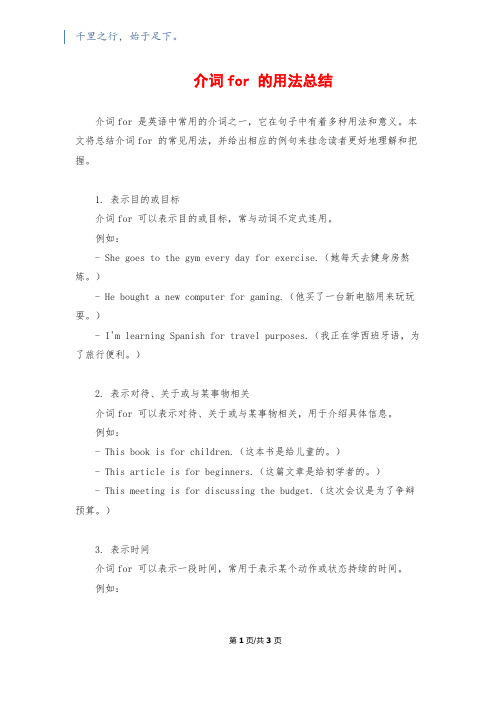
千里之行,始于足下。
介词for 的用法总结介词for 是英语中常用的介词之一,它在句子中有着多种用法和意义。
本文将总结介词for 的常见用法,并给出相应的例句来挂念读者更好地理解和把握。
1. 表示目的或目标介词for 可以表示目的或目标,常与动词不定式连用。
例如:- She goes to the gym every day for exercise.(她每天去健身房熬炼。
)- He bought a new computer for gaming.(他买了一台新电脑用来玩玩耍。
)- I'm learning Spanish for travel purposes.(我正在学西班牙语,为了旅行便利。
)2. 表示对待、关于或与某事物相关介词for 可以表示对待、关于或与某事物相关,用于介绍具体信息。
例如:- This book is for children.(这本书是给儿童的。
)- This article is for beginners.(这篇文章是给初学者的。
)- This meeting is for discussing the budget.(这次会议是为了争辩预算。
)3. 表示时间介词for 可以表示一段时间,常用于表示某个动作或状态持续的时间。
例如:第1页/共3页锲而不舍,金石可镂。
- He has been living in London for five years.(他已经在伦敦生活了五年。
)- I will be on vacation for two weeks.(我将休假两周。
)4. 表示代替或作为介词for 可以表示代替或作为的含义。
例如:- She is standing in for her manager while he is on vacation.(她在经理度假期间代理经理的职务。
)- He gave me his car for the weekend.(他把车借给我过周末。
介词for的用法归纳总结
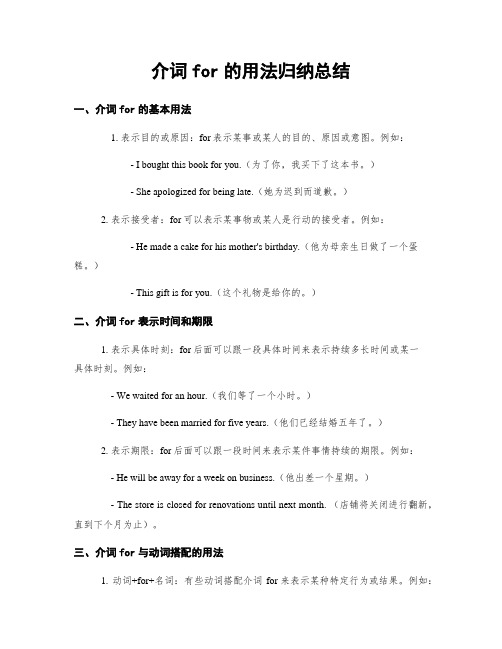
介词for的用法归纳总结一、介词for的基本用法1. 表示目的或原因:for表示某事或某人的目的、原因或意图。
例如:- I bought this book for you.(为了你,我买下了这本书。
)- She apologized for being late.(她为迟到而道歉。
)2. 表示接受者:for可以表示某事物或某人是行动的接受者。
例如:- He made a cake for his mother's birthday.(他为母亲生日做了一个蛋糕。
)- This gift is for you.(这个礼物是给你的。
)二、介词for表示时间和期限1. 表示具体时刻:for后面可以跟一段具体时间来表示持续多长时间或某一具体时刻。
例如:- We waited for an hour.(我们等了一个小时。
)- They have been married for five years.(他们已经结婚五年了。
)2. 表示期限:for后面可以跟一段时间来表示某件事情持续的期限。
例如:- He will be away for a week on business.(他出差一个星期。
)- The store is closed for renovations until next month. (店铺将关闭进行翻新,直到下个月为止)。
三、介词for与动词搭配的用法1. 动词+for+名词:有些动词搭配介词for来表示某种特定行为或结果。
例如:- Thank you for your help.(感谢你的帮助。
)- I apologized for my mistake.(我为我的错误道歉。
)2. 动词+for+动名词:部分动词和介词for可以搭配使用后接动名词形式,表示原因、目的等。
例如:- He is famous for writing novels.(他因写小说而出名。
)- I am sorry for interrupting you.(抱歉打断你了。
for的用法讲解

for的用法讲解一、for的基本用法在英语中,for是一个常见且多功能的词汇。
它可以用作介词、连词和副词,在不同的语境下有不同的用法和含义。
接下来我们将详细讲解for的各种应用。
1. 介词用法当for作为介词时,它表示目的、原因、利益或对象。
例如:- I bought flowers for my mother.(我给我妈妈买了花。
)- We need to study hard for good grades.(为了获得好成绩,我们需要努力学习。
)2. 连词用法作为连词,for主要连接并列句子或表示原因和结果关系。
例如:- I like both apples and oranges, for they are tasty and healthy.(我既喜欢苹果也喜欢橙子,因为它们又美味又健康。
)- He didn't pass the test, for he didn't study enough.(他没有通过考试,因为他没有好好学习。
)3. 副词用法作为副词时,for表达时间、程度或衡量事物的长度。
例如:- They have been waiting for hours.(他们已经等了几个小时了。
)- She is running for a long distance.(她正在跑长距离。
)二、常见短语和习惯用法除了基本的用法外,for还与其他词组合使用,形成各种常见短语和习惯用语。
掌握这些短语和用法能够帮助我们更灵活地运用for。
1. for example这个短语在英文写作中经常被使用,表示举例说明。
例如:Many fruits, such as apples and oranges, contain a lot of vitamins.(许多水果,比如苹果和橙子,含有大量的维生素。
)2. for sure/certain表示确信或肯定的意思,强调自己对某事有把握。
介词for的用法
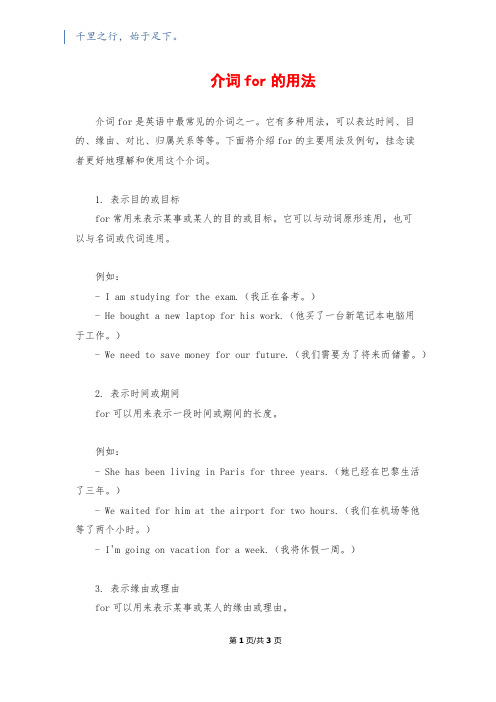
千里之行,始于足下。
介词for的用法介词for是英语中最常见的介词之一。
它有多种用法,可以表达时间、目的、缘由、对比、归属关系等等。
下面将介绍for的主要用法及例句,挂念读者更好地理解和使用这个介词。
1. 表示目的或目标for常用来表示某事或某人的目的或目标。
它可以与动词原形连用,也可以与名词或代词连用。
例如:- I am studying for the exam.(我正在备考。
)- He bought a new laptop for his work.(他买了一台新笔记本电脑用于工作。
)- We need to save money for our future.(我们需要为了将来而储蓄。
)2. 表示时间或期间for可以用来表示一段时间或期间的长度。
例如:- She has been living in Paris for three years.(她已经在巴黎生活了三年。
)- We waited for him at the airport for two hours.(我们在机场等他等了两个小时。
)- I'm going on vacation for a week.(我将休假一周。
)3. 表示缘由或理由for可以用来表示某事或某人的缘由或理由。
第1页/共3页锲而不舍,金石可镂。
例如:- He apologized for being late.(他为迟到向我们赔礼。
)- She thanked me for helping her.(她感谢我挂念她。
)- They are fighting for their rights.(他们正在为自己的权利而斗争。
)4. 表示对比或对比for常用来表示两个事物之间的对比或对比关系。
例如:- She is small for her age.(她相对于她的年龄来说身材较小。
)- He is tall for a 10-year-old boy.(对于一个10岁的男孩来说,他个子很高。
介词for用法完全归纳

介词for用法完全归纳介词for是一个最常用的介词,它的用法非常的广泛,有时候也很容易混淆,因此,本文将对介词for的用法进行一个完整的归纳。
一、表示时间介词for可以用来表示时间,可以用来指定一段持续的时间,比如for five days, for a week等。
另外,也可以用来表示在某段时间内发生的动作,比如for a long time, for ages等。
二、表示理由介词for也可以用来表示理由,比如I am late for work,for a good reason等。
同时,也可以用于构成一些固定的句型,比如be good for sth.比如说这种药物对这种疾病非常有利,就可以说The medicine is good for the disease.三、表示有关系介词for也可以表示一种有关系,比如爱好、偏好以及目的,比如I work for a company, she is famous for her beauty等。
此外,也可以用于对某人发出的感谢,比如Thank you for your help, thank you for coming等。
四、表示所属介词for也可以用来表示一种所属关系,比如物品的所有者,比如This book is for me, this dress is for you等。
另外,也可以用来指定某种特定的人群来获取某种东西,比如This book is forchildren, these toys are for students等。
以上是介词for的用法完全归纳,简而言之,介词for的用法可以划分为表示时间、表示理由、表示有关系和表示所属四种情况。
它们可以在任何时候、任何地方使用,更多的用法要根据实际情况灵活运用。
介词for用法大全_用法辨析 英语语法.doc
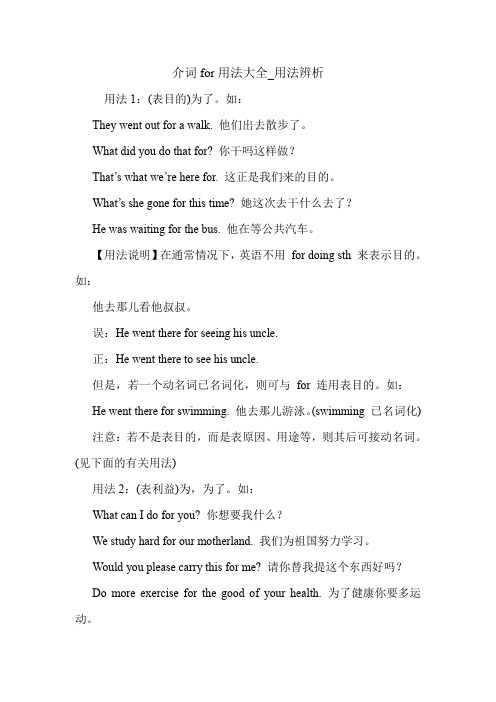
介词for用法大全_用法辨析用法1:(表目的)为了。
如:They went out for a walk. 他们出去散步了。
What did you do that for? 你干吗这样做?That’s what we’re here for. 这正是我们来的目的。
What’s she gone for this time? 她这次去干什么去了?He was waiting for the bus. 他在等公共汽车。
【用法说明】在通常情况下,英语不用for doing sth 来表示目的。
如:他去那儿看他叔叔。
误:He went there for seeing his uncle.正:He went there to see his uncle.但是,若一个动名词已名词化,则可与for 连用表目的。
如:He went there for swimming. 他去那儿游泳。
(swimming 已名词化) 注意:若不是表目的,而是表原因、用途等,则其后可接动名词。
(见下面的有关用法)用法2:(表利益)为,为了。
如:What can I do for you? 你想要我什么?We study hard for our motherland. 我们为祖国努力学习。
Would you please carry this for me? 请你替我提这个东西好吗?Do more exercise for the good of your health. 为了健康你要多运动。
【用法说明】(1) 有些后接双宾语的动词(如buy, choose, cook, fetch, find, get, order, prepare, sing, spare 等),当双宾语易位时,通常用for 来引出间接宾语,表示间接宾语为受益者。
如:She made her daughter a dress. / She made a dress for her daughter. 她为她女儿做了件连衣裙。
- 1、下载文档前请自行甄别文档内容的完整性,平台不提供额外的编辑、内容补充、找答案等附加服务。
- 2、"仅部分预览"的文档,不可在线预览部分如存在完整性等问题,可反馈申请退款(可完整预览的文档不适用该条件!)。
- 3、如文档侵犯您的权益,请联系客服反馈,我们会尽快为您处理(人工客服工作时间:9:00-18:30)。
介词for用法归纳用法1:(表目的)为了。
如:They went out for a walk. 他们出去散步了。
What did you do that for? 你干吗这样做?That’s what we’re here for. 这正是我们来的目的。
What’s she gone for this time? 她这次去干什么去了?He was waiting for the bus. 他在等公共汽车。
【用法说明】在通常情况下,英语不用for doing sth 来表示目的。
如:他去那儿看他叔叔。
误:He went there for seeing his uncle.正:He went there to see his uncle.但是,若一个动名词已名词化,则可与for 连用表目的。
如:He went there for swimming. 他去那儿游泳。
(swimming 已名词化)注意:若不是表目的,而是表原因、用途等,则其后可接动名词。
(见下面的有关用法)用法2:(表利益)为,为了。
如:What can I do for you? 你想要我什么?We study hard for our motherland. 我们为祖国努力学习。
Would you please carry this for me? 请你替我提这个东西好吗?Do more exercise for the good of your health. 为了健康你要多运动。
【用法说明】(1) 有些后接双宾语的动词(如buy, choose, cook, fetch, find, get, order, prepare, sing, spare 等),当双宾语易位时,通常用for 来引出间接宾语,表示间接宾语为受益者。
如:She made her daughter a dress. / She made a dress for her daughter. 她为她女儿做了件连衣裙。
He cooked us some potatoes. / He cooked some potatoes for us. 他为我们煮了些土豆。
注意,类似下面这样的句子必须用for:He bought a new chair for the office. 他为办公室买了张新办公椅。
(2) 注意不要按汉语字面意思,在一些及物动词后误加介词for:他们决定在电视上为他们的新产品打广告。
误:They decided to advertise for their new product on TV.正:They decided to advertise their new product on TV.注:advertise 可用作及物或不及物动词,但含义不同:advertise sth=为卖出某物而打广告;advertise for sth=为寻找某物而打广告。
如:advertise for a job=登广告求职。
由于受汉语“为”的影响,而此处误加了介词for。
类似地,汉语中的“为人民服务”,说成英语是serve the people,而不是serve for the people,“为某人的死报仇”,说成英语是avenge sb’s death,而不是avenge for sb’s death,等等。
用法3:(表用途)用于,用来。
如:Knives are used for cutting things. 小刀是用来切东西的。
This knife is for cutting bread. 这把小刀是用于切面包的。
It’s a machine for slicing bread. 这是切面包的机器。
The doctor gave her some medicine for her cold. 医生给了她一些感冒药。
用法4:为得到,为拿到,为取得。
如:He went home for his book. 他回家拿书。
He went to his friend for advice. 他去向朋友请教。
She often asked her parents for money. 她经常向父母要钱。
We all hope for success. 我们都盼望成功。
Are you coming in for some tea? 你要不要进来喝点茶?用法5:给(某人),供(某人)用。
如:That’s for you. 这是给你的。
Here is a letter for you. 这是你的信。
Have you room for me there? 你那边能给我腾出点地方吗?用法6:(表原因、理由)因为,由于。
如:I am sorry for it. 对不起。
Thank you for coming to see me. 谢谢你来看我。
You can’t see the wood for the trees. 你只见树木,不见森林。
He is famous for his poems. 他因为他的诗出名。
He was sent to prison for robbery. 他因为抢劫而坐牢。
I couldn’t speak for laughing. 我笑得说不出话来。
He couldn’t sleep for joy. 他高兴得不能入睡。
For several reasons, I’d rather not meet her. 由于种种原因,我宁愿不见她。
【用法说明】有些表原因的特殊结构不宜用介词for 来引出,而用其他介词。
如:他由于努力工作而加了工资。
误:For the result of his hard work, he got a pay rise.正:As a [the] result of his hard work, he got a pay rise.注:as a [the] result of 是习语,意为“由于……的结果”。
因为母亲不在家,她只好自己做饭。
误:For Mother (being) away, she had to cook the meal herself.正:With Mother (being) away, she had to cook the meal herself.注:“with+宾语+宾语补足语”可用来表示原因,此时的with 不能换成for。
类似地,下例中的with 也不能换成for:With all this work to do, I don’t know if I’ll have time to go out. 有这么多工作要做,我不知是否有时间出去。
我们祝贺你的成功。
误:We congratulate you for your success.正:We congratulate you on your success.注:congratulate 后习惯上接介词on 表示原因。
用法7:(表目标、去向)去。
如:Is this bus for Chicago? 这辆公共汽车开往芝加哥吗?They’ll leave for Beijing tomorrow. 明天他们动身去北京。
They set off for the shops. 他们买东西去了。
Is this the train for Shanghai? 这是开往上海的火车吗?Passengers for Tianjing must change at Beijing. 去天津的旅客必须在北京换车。
【用法说明】比较for 与to,两者均可表示目的地,注意以下区别:for 通常与leave, start, set out, set off, head, steer, depart, be bound, be destined 等动词连用,而to 则通常与come, drive, fly, get, go, lead, march, move, return, ride, run, travel, walk 等动词连用。
如:We departed for London at 10 am. 我们上午10点动身去伦敦。
Then we drove to the station. 然后我们就开车去了车站。
有时,同一个动词(如sail)两者均可连用,但含义稍有差别:用for 通常只表示向着某目的地那个方向,并不强调到达的意思;而to 含有到达某目的地的意思。
如:They sailed for Shanghai. 他们开船驶往广州。
They sailed to Shanghai. 他们开船驶至广州。
若与名词连用,也有类似区别。
如:There will be a train for Wuhan. 有开往武汉的火车。
(仅表示向武汉方向,但在武汉未必是停靠站) There will be a train to Wuhan. 有开往武汉的火车。
(开往武汉方向,且在武汉停靠)顺便说一句,也有的辞书持几乎相反的观点,认为for 与to 表示目的地时,for 表示的是预定目的地,而to 表示的是假设将会到达的目的地。
用法8:(表时间、距离、数量等)达,计。
如:I’m going away for a few days. 我要走开几天。
I’ve been here for ten years. 我来这儿有10年了。
He walked for ten miles. 他走了10英里路。
The shop sent me a bill for $50. 商店给我送来了一张50美元的账单。
【用法说明】for 用于表示时间或距离的长度(尤其是紧跟在动词之后)时,有时可省略。
如:The meeting lasted (for) three days. 会议持续了3天。
They walked (for) fifty miles. 他们走了50英里。
但是当for 短语位于句首或在否定句中时, for 通常不宜省去。
如:For ten years he lived here. 他在这里住过10年。
We have not heard from him for a long time. 我们很久没收到他的来信了。
用法9:对,对于。
如:Eggs are good for you. 鸡蛋对你有好处。
Reading in bed is bad for your eyes. 躺在床上看书对你的眼睛不好。
Fortunately for me, the train was also late. 我很走运,火车也晚点了。
【用法说明】关于for 与to 表示“对……来说”时的区别,参见to。
